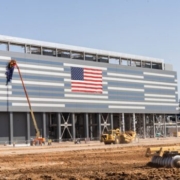Polis Officials Choose Tech Over Manufacturing: A Decision That Deserves Scrutiny
Last month I reported on the national competition for 20 regional innovation hubs (RIH) – to be funded by the CHIPs and Science Act – and the six Colorado entries invited to present to the Polis administration per its TechHubNow! initiative. The process was intended to preview the entries, enable feedback and, in the end, allow the Polis team to select its favorite even as other entries were encouraged to continue if they chose.
And that’s what happened. Polis’ TechHubNow! team threw its weight behind two entries and, not surprisingly, the U.S. Economic Development Administration (EDA) selected one of those entries, Elevate Quantum Colorado, as one of 31 national finalists in the competition for five new hubs.
The announcement was cause for celebration in Denver’s business press. The Colorado Sun announced, “Colorado named a U.S. Tech Hub for Quantum Computing.” The Denver Business Journal proclaimed that, “Colorado won a coveted tech hub designation. See why the state beat other tech regions.” But they didn’t really explain why.
That’s partly because the state hasn’t won anything, yet. As the EDA points out, “Designation is an endorsement of the region’s plans to supercharge their respective technological industries to create jobs, strengthen U.S. competitiveness, and protect national security.”
But an “endorsement” would be hollow if Colorado’s designee doesn’t actually win and, today, the Polis administration’s decision to back a promising but nascent technology entry, and not one aligned with Colorado’s advanced manufacturing ecosystem, deserves more scrutiny from leaders of his state’s highly regarded manufacturing community.
The RIH competition is progeny of the CHIPs and Science Act – legislation intended to fuel a new U.S. semiconductor manufacturing ecosystem. (Read my interview with InnovaFlex Foundry’s Lindsay Pack to better understand why.) Acknowledging that multiple technology and manufacturing-related paths are required to build out a modern U.S. sector, the EDA left room for entrants to interpret “innovation” through whatever lens they chose.
For their part, Polis officials chose a pure-play tech route. Quantum computing is next-level stuff – its applications may change our core computing methodologies. Elevate Quantum is also in good company: the EDA selected two quantum nominees among the 31 finalists, the other being The Bloch Tech Hub, a multi-state initiative based in Chicago that counts the Biden-friendly Illinois governor J.B. Pritzker among its champions.
But while quantum computing is many things, what Elevate Quantum is not is a change agent for short-term advanced manufacturing-related outcomes in Colorado and envisioned by CHIPs.
What should be concerning for Colorado manufacturers is that other Colorado entries seemed better aligned with the RIH RFP’s manufacturing focus. One nominee emerged from the process as a stronger, more inclusive option – much to the TechHubNow! team’s credit. The RAMP: Readiness Accelerated Manufacturing and Production became a collaboration among space-related industry groups, nameplate aerospace OEMs, community colleges and, importantly, regional participants in Wyoming – checking the box of a key EDA RIH criteria. (Without the Polis endorsement, RAMP didn’t make the finals.)
But Colorado officials read “innovation economy” to mean “technology economy.” Presented an opportunity to invest in Colorado’s manufacturing economy, the Polis team passed and chose tech.
The “why” is not a mystery: Governor Polis was first a technology executive. His go-to backers, including the TechHubNow! team, are tech investors and advocates. If Midwest and Rustbelt governors view their economic fortunes through a manufacturing-informed lens, the Polis team sees technology.
Can Elevate Quantum win one of the five coveted designations? It would vindicate the Polis worldview. But several factors are working against it.
At its core, CHIPs is a workforce engine, a tentacle of programs that, collectively, lay the groundwork to recruit and train a new generation of advanced manufacturing employees, attracted by the prospect of working in an up-and-coming industry, on projects that uptool our national capability to “manufacture, commercialize, and deploy critical technologies.”
Recent events have highlighted America’s semiconductor workforce deficit – most notably Taiwan Semiconductor Corporation’s (TSMC) decision to delay the opening of its Arizona factory by a year, citing a lack of qualified workers.
Regional innovation hubs are also intended to be just that – regional – inclusive of communities that historically have been underserved by programs like CHIPs/RIH. The Bloch Tech Hub is a three-state consortium: Illinois, Indiana, and Wisconsin. Colorado’s finalist is a Front Range-focused, multi-county initiative underwritten by the same technology R&D ecosystem that’s benefitted from most-favored status throughout two Polis administrations. There’s nothing underserved or neglected about Elevate Quantum’s investor community or downstream recipients.
It’s possible that Colorado’s TechHubNow! team is playing the RIH game just right. The farther away from Washington D.C. the CHIPs Act travels, the less its outcomes seem to track to the fortunes of U.S. manufacturing.
By choosing tech over manufacturing, Polis may have unwittingly contributed to this outcome in his home state.
We’ll know soon enough.
Bart Taylor is a Moss Adams BDE and founder and former publisher of CompanyWeek manufacturing media. Reach him at bart.taylor@mossadams.com.

